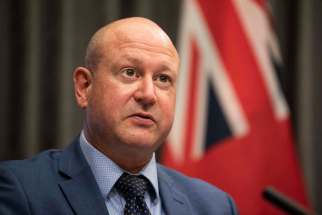Pallister bullied, lost and left big bill for successor to cover Tories will pay for failed, 'draconian' wage-freeze tactics on balance sheet, at ballot box
Read this article for free:
or
Already have an account? Log in here »
To continue reading, please subscribe:
Monthly Digital Subscription
$0 for the first 4 weeks*
- Enjoy unlimited reading on winnipegfreepress.com
- Read the E-Edition, our digital replica newspaper
- Access News Break, our award-winning app
- Play interactive puzzles
*No charge for 4 weeks then price increases to the regular rate of $19.00 plus GST every four weeks. Offer available to new and qualified returning subscribers only. Cancel any time.
Monthly Digital Subscription
$4.75/week*
- Enjoy unlimited reading on winnipegfreepress.com
- Read the E-Edition, our digital replica newspaper
- Access News Break, our award-winning app
- Play interactive puzzles
*Billed as $19 plus GST every four weeks. Cancel any time.
To continue reading, please subscribe:
Add Free Press access to your Brandon Sun subscription for only an additional
$1 for the first 4 weeks*
*Your next subscription payment will increase by $1.00 and you will be charged $16.99 plus GST for four weeks. After four weeks, your payment will increase to $23.99 plus GST every four weeks.
Read unlimited articles for free today:
or
Already have an account? Log in here »
Hey there, time traveller!
This article was published 30/09/2021 (1531 days ago), so information in it may no longer be current.
Although former Premier Brian Pallister has stepped down from his roles as first minister and leader of the Progressive Conservative party, his presence will be felt in government for some time to come. Particularly when it comes time to cover the costs of foolish decisions he made when he was in charge.
There are several instances where Pallister, desperate to shrink the overall footprint of government to create the fiscal wiggle room to cut taxes, left huge unpaid bills behind. But none may be as problematic as the cost of unsettled contracts with public-sector workers.
The Pallister government passed but never proclaimed Bill 28, otherwise known as the Public Services Sustainability Act in 2017 to help wrestle the province’s deficit under control. Pallister stopped short of enacting the law, choosing instead to use the threat of proclamation to bully unions into settling.
That plan fell apart one year ago, when a Court of Queen’s Bench judge determined the PSSA was “draconian” and violated the right of 120,000 public sector union members to meaningful collective bargaining. Pallister sneered at the verdict and instructed his government to appeal.
The sense from Pallister government insiders was the court decision was irrelevant because they had won years of wage freezes from public-sector workers by simply waiting for unions to come willingly to the table and accept the PSSA’s terms: two years of wage freezes and then annual pay increases of 0.75 and one per cent.
But is that what really happened? Did Pallister get what he wanted without having to enact a controversial law?
New figures provided by the Manitoba Federation of Labour tell a much different story. According to the MFL’s database of contract settlements, hardly any public-sector unions took the bait and willingly accepted the terms of Bill 28.
From passing of the legislation until June 2020, when the law was struck down, 24 collective agreements representing about 8,865 workers involved in the legal challenge settled for the PSSA terms.
The more than 100,000 remaining employees that waited until the law was struck down have had a much different experience.
The throbbing hangover from the ill-fated bill will linger for years to come.
Bit by bit, those unions have won wage increases that outstrip those mandated in the PSSA. Many teachers in the province have been settling for annual wage increases of 1.4 to 1.6 per cent. Crown attorneys recently won an arbitrated three-year settlement with government for annual wage increases averaging more than one per cent.
In total, nine contracts have been signed in the year since the PSSA court decision, providing increases for more than 23,000 employees that are at least double what the government sought in its ill-fated wage-freeze legislation. That leaves just under 100,000 other public- sector workers who need agreements, and the sense from the unions is they will get more than the government wanted to give under the PSSA.
And that means the throbbing hangover from the ill-fated bill will linger for years to come.
The wage increases post-PSSA are not exorbitant. But there are tens of millions of dollars — potentially hundreds of millions — in retroactive pay owed to civil servants when Pallister suspended collective bargaining. That means the two years of wage freezes Pallister hoped to achieve on the front end of the four-year PSSA schedule will be wholly unrealized for all but a handful of public servants.
And, depending on how the appeal goes, there’s a good chance any union that settled before the PSSA was struck down might get a do-over.
Pallister and the PSSA have soured government’s relationship with public-sector workers.
The coalition of unions that fought the PSSA are seeking court costs, potential damages for the government’s violation of the right to collective bargaining and — wait for it — the court’s permission to allow any union that settled for PSSA terms to reopen negotiations. Those requests cannot be dealt with until the appeal is decided.
It’s also important to note that most of the contracts being settled right now do not provide much in the way of wage certainty past the next year or so. Given that so many contracts had expired years earlier, the new deals carry forward just until later this year or next.
That means shortly after settling overdue contracts, government will be forced back to the table for new negotiations with public-sector unions that are already cranky about being threatened by the PSSA. And now that the government has a legitimate fiscal crisis to deal with — the pandemic has driven a record deficit — it will be interesting to see if any union is interested in accepting a wage freeze going forward.
It would be easy to call the whole debacle surrounding the PSSA penny wise and pound foolish. Others may revel in the fact that Pallister tussled with the unions, without worrying about the costs.
But the negative consequences of this cynical, flawed legislation go so much deeper than the combined value of all the retroactive wage increases that the government is being forced to pony up now.
Pallister and the PSSA have soured government’s relationship with public-sector workers. And at some point the next leader of the government is going to realize these people are not just employees, they are also going to be motivated voters in the 2023 provincial election.
dan.lett@freepress.mb.ca

Born and raised in and around Toronto, Dan Lett came to Winnipeg in 1986, less than a year out of journalism school with a lifelong dream to be a newspaper reporter.
Our newsroom depends on a growing audience of readers to power our journalism. If you are not a paid reader, please consider becoming a subscriber.
Our newsroom depends on its audience of readers to power our journalism. Thank you for your support.









